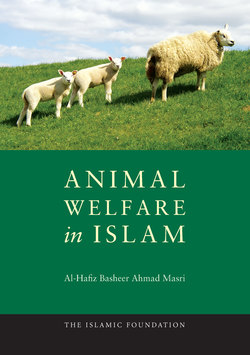Читать книгу Animal Welfare in Islam - Al-Hafiz Basheer Ahmad Masri - Страница 5
На сайте Литреса книга снята с продажи.
ОглавлениеPUBLISHER’S NOTE
IT IS OUR pleasure to bring out this revised edition of al-Hafiz B.A. al-Masri’s important work Animal Welfare in Islam in collaboration with Compassion in World Farming. The appearance of this work, we believe, will help underscore the concern and compassion for animals which permeate the Islamic teachings. It is a quirk of irony that Islam, which stands for treating animals well in that like human beings they too, are the wonderful creatures of Allah, is maligned in certain quarters for its alleged anti-animal stance. In Islamic dietary code meat, no doubt, figures prominently and Muslims, cutting across their ethnic origins, have been eating meat for ages. Yet this should not be misconstrued in terms of treating animals callously. Islam exhorts that animals deserve man’s care and compassion. The Qur’ān adduces animals as a sign of Allah’s wonderful creative power. Several incidents in the Prophet’s glorious life illustrate his considerate concern for animal welfare. Many directives of his are on record in standard Aḥādīth collections, which urge Muslims to be kind towards animals. Al-Masri’s present work accomplishes a remarkable job in bringing into sharper focus the place animals enjoy in the Islamic scheme of things. It documents the concrete steps the Muslim polity took for the cause of animal welfare at a time when this concept was little known and hardly appreciated.
Yet it is time for Muslim society to take stock of its attitude towards animals in the light of the Islamic code on this issue. There is a pressing need for ensuring better conditions at slaughter houses in particular, and for better care of animals in general. In discharging this duty conscientiously Muslims would earn greater reward in the Next Life and, more importantly, secure Allah’s pleasure, the highest felicity imaginable for them. It is time also for holding discussion on the vexed issue of stunning prior to slaughter. Let us objectively examine this issue against the backdrop of Islamic teachings, while bearing in mind the current practices and mass production of meat. This discussion assumes more significance and relevance especially in the Western countries with a sizeable Muslim population. Let us try to find ways and means for adapting our practice to the law of the land, without provoking any confrontation.
We are sure this work will achieve its twin objectives – of presenting the humane Islamic teachings on animal welfare and of drawing the attention of the Muslim community to the various nuances and dimensions of the issue of animal welfare as it figures in the West as part of the public agenda.
I take this opportunity to thank Joyce D’Silva, Ambassador to ‘Compassion in World Farming’ who pursued patiently and consistently this important collaborative project. I do hope our partnership will help realize our common goal of animal welfare. I must thank also my colleagues, especially Mary Barber, Naiem Qaddoura and Anwar Cara of the Islamic Foundation for their cooperation, as well as Dr. Shuja Shafi of the Muslim Council of Britain for his invaluable advice. May Allah reward them and enable all of us to engage in such pursuits which accrue to us His reward and blessings, Āmīn.
| Leicester | Dr. M. Manazir Ahsan |
| Dhū al-Ḥijjah 1427H | Director General |
| January 2007 CE | Islamic Foundation |
